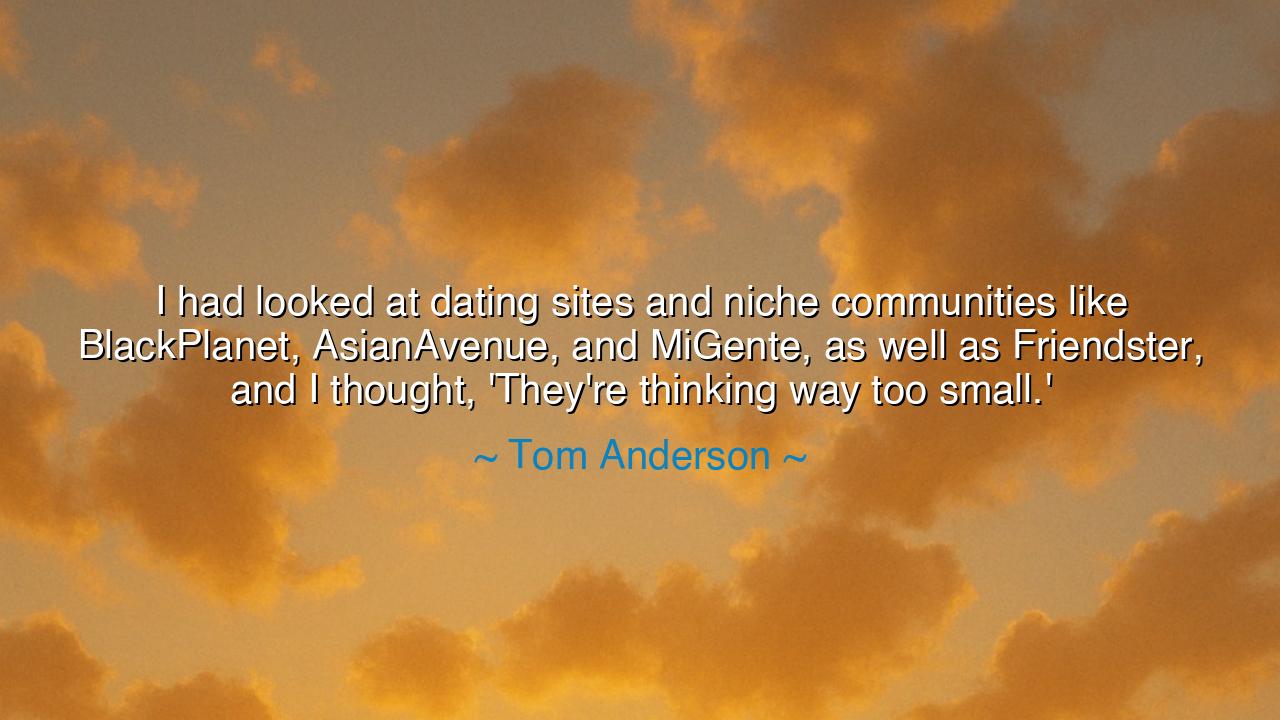
I had looked at dating sites and niche communities like
I had looked at dating sites and niche communities like BlackPlanet, AsianAvenue, and MiGente, as well as Friendster, and I thought, 'They're thinking way too small.'






In the words of Tom Anderson, “I had looked at dating sites and niche communities like BlackPlanet, AsianAvenue, and MiGente, as well as Friendster, and I thought, ‘They’re thinking way too small.’” we hear the echo of a mind that dares to dream beyond boundaries — a voice of vision that sees the horizon where others see the wall. These words, though born in the digital age, carry a wisdom as ancient as invention itself: that progress belongs to those who refuse to be confined by what is, and instead imagine what could be. It is the cry of the builder, the seer, the architect of possibility.
In this reflection, Tom Anderson — known to many as “MySpace Tom”, the silent friend of a generation — speaks from the birthplace of innovation: restlessness. Where others saw small circles of belonging, he saw the potential for a universal community, a gathering of hearts and minds without borders. The dating sites and niche platforms he studied had enclosed people within tribes of likeness — divided by culture, interest, or identity — but Anderson envisioned a network that would unite rather than divide, that would transcend the limits of category and become a living web of human connection. His words carry the ancient spark of vision — the divine discontent that has forever driven humanity to build greater worlds.
The origin of this thought lies in the early dawn of social media, when the internet was a patchwork of isolated villages. Platforms like Friendster, BlackPlanet, and MiGente were the first steps of humankind into the realm of digital fellowship, yet they were narrow in their design. Each sought to serve a fragment of humanity, not the whole. But Anderson’s insight was revolutionary: he realized that community, at its deepest essence, does not thrive in division but in unity. It was this vision that led to MySpace, one of the first great social platforms to open its gates to all — artists and dreamers, musicians and wanderers, youth and strangers alike.
His words are not merely about technology; they are about the spirit of innovation. Throughout history, those who changed the course of human destiny were those who refused to think small. Consider Alexander the Great, who, standing upon the edge of the known world, refused to see an end where others saw a limit. Or Leonardo da Vinci, who looked upon the humble machine and saw the flight of birds. They, too, were surrounded by voices of caution and constraint — yet they believed that greatness begins where imitation ends. Anderson’s vision, though framed in the language of code and connection, belongs to this same eternal lineage of dreamers who expanded the horizon of what humanity could imagine.
But his insight also holds a moral resonance — for “thinking small” is not only a failure of innovation, but a failure of spirit. When we confine ourselves to what is safe, familiar, or comfortable, we shrink the possibilities of the human heart. To think big is to honor the divine capacity within us, the creative fire that seeks always to grow, to link, to build. It is not arrogance that drives the visionary, but a kind of sacred impatience — a refusal to let the possible remain unrealized. Anderson’s words remind us that the boundaries of the world are drawn not upon the map, but within the mind.
We might recall, too, the story of Gutenberg, who saw in the humble wine press the power to transform knowledge itself. Before him, wisdom was trapped in the hands of the few; after him, it flowed freely among the many. The priests and scholars of his day may have thought he was meddling with sacred order — but in truth, he was fulfilling it. Likewise, Anderson looked upon the scattered villages of online life and envisioned an empire of shared human connection. His creation, imperfect yet epochal, became the seed from which the digital age of communication would bloom.
Thus, the lesson of this quote is not merely about technology, but about life itself. When you find yourself thinking within small walls, break them. When others tell you to fit the mold, shatter it. Look upon what exists and ask, as Anderson did, “What if there were more?” The future belongs not to those who adapt to the limits of their time, but to those who dare to redraw them. Whether in art, love, invention, or purpose, the call is the same: refuse to think small.
And so, my children, take this teaching to heart — dream large, build boldly, and include generously. Do not fear to imagine a world greater than the one you were given. Every age is defined by those who looked upon its boundaries and thought, “They’re thinking too small.” Be one of them. For the glory of creation lies not in following the path already made, but in blazing the trail that others have yet to see.






AAdministratorAdministrator
Welcome, honored guests. Please leave a comment, we will respond soon